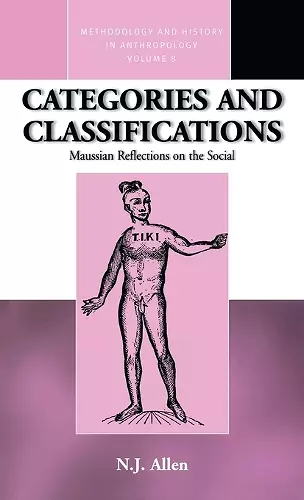Categories and Classifications
Maussian Reflections on the Social
Format:Hardback
Publisher:Berghahn Books, Incorporated
Published:1st Jan '01
Currently unavailable, and unfortunately no date known when it will be back

Marcel Mauss (1872-1950), Durkheim's nephew, was a key figure among Durkheimians and helped to found the distinctive French tradition in the social sciences at the start of the 20th century. He dominated the teaching of social anthropology in Paris between the Wars, and his Essay on the Gift (1925) is a well established classic. However, it is only recently that the breadth and freshness of his oeuvre as a whole is being reassessed and is gaining wider appreciation.
Having found inspiration in Mauss's texts for over twenty years, the author here explores not only what he thought but also how his ideas can be developed and applied in new ways. Thus Durkheim and Mauss's notion of "primitive classification," often misunderstood, is well exemplified by Indo-European ideology as analysed by Georges Dumezil and current comparativists, and it is argued that this ancient ideology influenced the Durkheimian classification of "social facts." Mauss's reflections on kinship and social aggregation point us towards aspects of proto-human societies that are underemphasized by contemporary palaeoanthropology, and his vision of world history in terms of emic categories - fundamental ideas such as person, space, totality, substance - casts new light on much we take for granted, as well as on The Gift. Mauss specialized in religion, and his treatment of the rubric goes beyond his uncle's unitary definition in terms of the sacred.
In assembling and presenting his essays on this intellectual giant, the author tries both to convey the range and quality of Mauss's mind and to take further his scattered and partial insights.
“The excavation and reconstruction of Maussian meanings proves richly gratifying to the intellectual archaeologist.”• American Anthropologist
“Many of the items in this book are thought-provoking … One of its strengths is the insights it frequently gives into the divergences between Mauss's and Durkheim's thought.”• Anthropological Theory
“This is an important book … by paying attention to the cultural construction of violence across time we can hope to be better able to explain the complex social dynamics that give rise to the actual use of violence.”• Anthropological Theory
ISBN: 9781571818089
Dimensions: unknown
Weight: 354g
172 pages